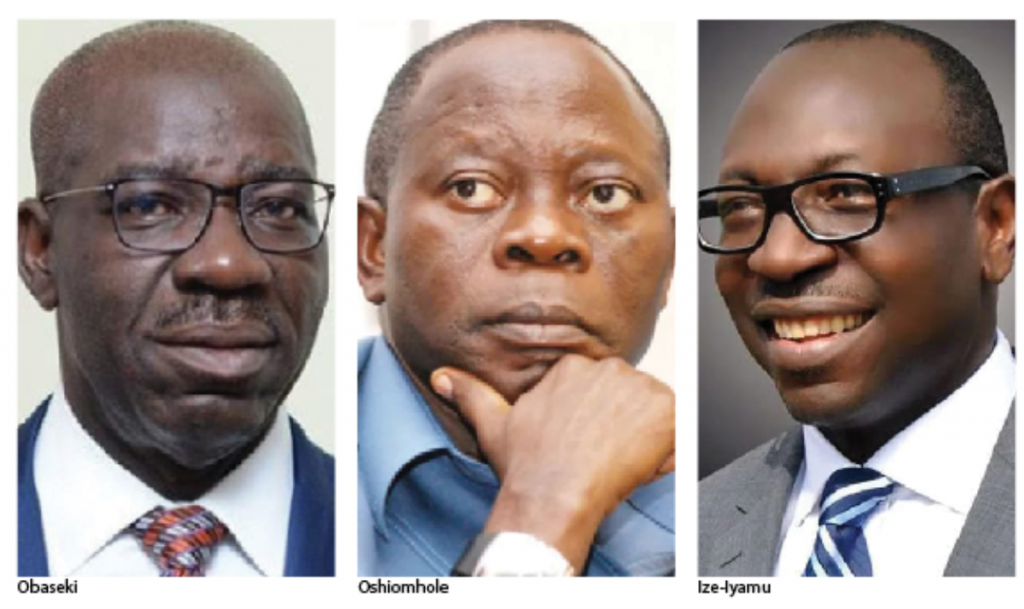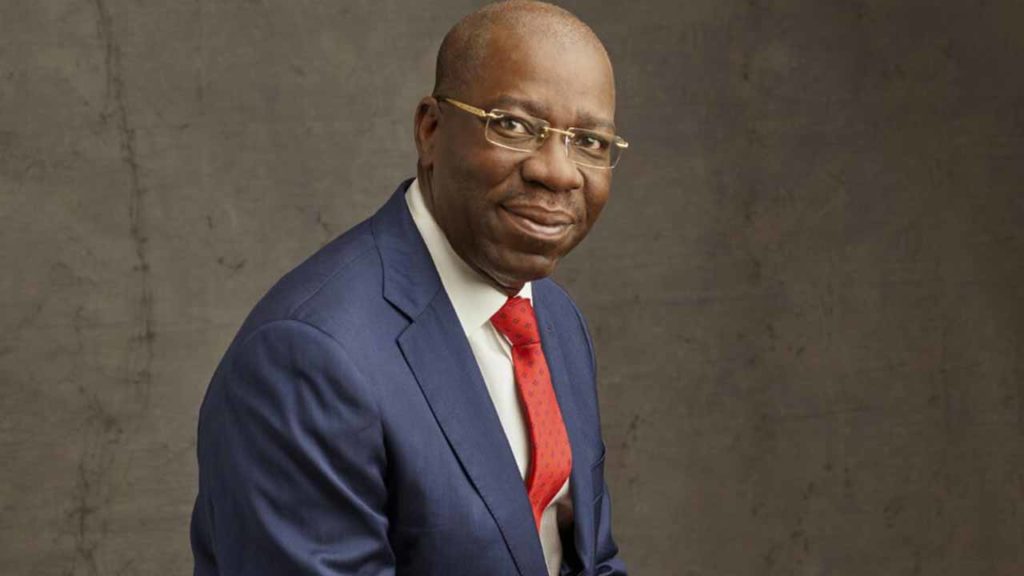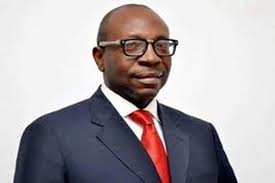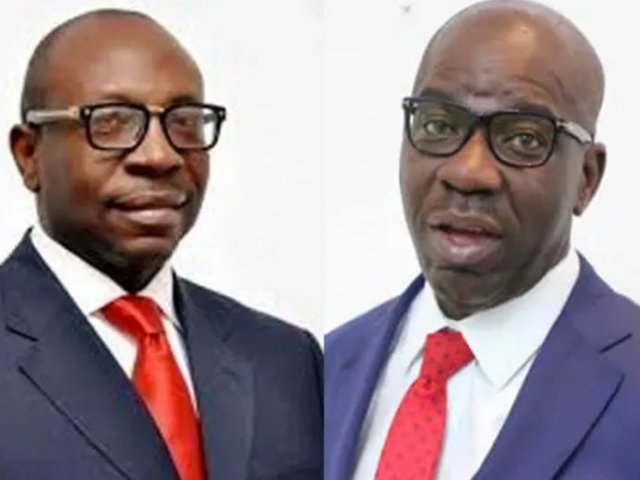As the countdown towards the September 19, 2020, election in Edo State gathers momentum, BrandiQ Chief Correspondent, Martin Ogumah, who visited the state, writes in this special report that the crucial election is Governor Obaseki’s to lose.
The politics of Edo State is at a feverish pitch as the countdown towards the September 19 crucial election gathers momentum. On the political ring are incumbent Governor Godwin Obaseki of the Peoples’ Democratic Party (PDP) and Pastor Osagie Ize-Iyamu of the All Progressives’ Congress (APC). Since elections are often a referendum on the incumbent, pointers on the ground indicate that the election is Obaseki’s to lose as his achievements of the past four years speaks glowingly for another term.
However, keeping a firm grip on the levers of power is vital for the APC as its opponents in the PDP draw attention to the failures of the APC at the federal level. At the state and regional levels, the APC wants to hang onto Edo State, the only state in the south-south that it controls prior to Obaseki’s exit. If it slips to the PDP the party would not be able to use the state as the launchpad for making inroads to the south-south.
Regional Political Intrigues
Make no mistake about it, the Edo polls is a dress rehearsal about 2023 as well. As the subtle calculations and permutations toward the 2023 election commence, Edo state politics sits at the crosshairs. Regional politics is fundamental in Nigeria’s federal system. Any serious contender in the 2023 national elections will have strongholds across the country.

On a personal level, the battle in Edo State is between Governor Godwin Obaseki and his erstwhile political godfather Adams Oshiomhole, the ousted national chairman of the APC. Obaseki won the 2016 gubernatorial election in Edo on the APC ticket but then fell out badly with Oshiomhole. Oshiomhole used his power within party structures to block Obaseki’s nomination for a second term as governor in this year’s election.
That triggered Obaseki’s defection to the opposition PDP, although he remains the incumbent governor, with all its powers of patronage, until the September election. And Oshiomhole has shoe-horned in his protégé Osagie Ize-Iyamu as the APC’s candidate for the Edo governorship despite having berated him as someone who is corrupt, lacked the capacity for governance and can’t be trusted. Curiously, they made up for political exigencies. Thus, this election is much more than a battle between incumbent Obaseki and challenger Ize-Iyamu; Oshiomhole’s political future hangs in the balance should Obaseki wins.
For Oshiomhole, and his ally Bola Tinubu, this is a dry run for their turbulent campaign for national leadership. Despite his recent and emphatic denials, Tinubu is still seen as a leading contender for the APC’s presidential ticket in 2023. An Obaseki and PDP victory in Edo would be a serious blow to the standing of the Oshiomhole-Tinubu faction in the party. When added to the suspension of Oshiomhole as national chairman last year, and the recent dissolution of the party’s National Working Committee – where they had a powerful base – this would make it still harder for the pair to win back their standing. This is why for Oshiomhole; Ize-Iyamu is an ally of convenience.
Why Is Obaseki Feared?
If there is one opponent that the APC dread in Edo State, it is the incumbent governor, Mr Godwin Obaseki. The reason is not far-fetched, a little while ago; the Edo governor was a member of the APC, even though he was treated like a leper for a season by key decision-makers in the political party, particularly its erstwhile National Chairman, Comrade Adams Oshiomhole. What began as a minor misunderstanding between the two men was mismanaged. The gulf of distrust became so wide that it was impossible to reach across the divide for a friendly handshake.
Powerful individuals and interest groups had weighed in on the war between the political godfather, Oshiomhole and his estranged godson, Obaseki. The APC National Leader, Asiwaju Bola Tinubu overtly threw his weight behind Oshiomhole, while the former National Chairman of the party Chief John Odigie-Oyegun backed Obaseki.
Finally, the differences took an irreconcilable turn. Obaseki was denied the APC gubernatorial ticket which would have enabled him to take a second chance at the office of the governor in the impending governorship contest. What was APC’s apparent loss became PDP’s gain. The tables turned quickly as Obaseki switched political party loyalty to the People’s Democratic Party (PDP). In a twinkle of an eye, the PDP had become the ruling party in Edo. The permutation for the governorship contest was altered. Obaseki who was threatened with the ‘Ambode treatment’, meaning, denial of second term opportunity like Ambode Akinwunmi, past governor of Lagos State. He will not be given the opportunity to serve a second term, haven showed that he was not willing to yield an inch without giving the fight of his life. His supporters are boasting that the APC made a fatal error by giving its governorship ticket to Pastor Osagie Ize-Iyamu. In their reckoning, APC has kissed the state goodbye.

When the political imbroglio in Edo started, many did not give Obaseki a chance. Coming up against the much experienced Oshiomhole who had fought many battles against military dictatorships and challenged faltering civilian administrations, many expected Obaseki to be a walkover. Nobody gave him a chance. What they did not reckon with is that the man understood the inner workings of the Edo State government like the back of his palm. For about seven years, Obaseki was a trusted lieutenant, who served Oshiomhole as the Chairman of the Edo State Economic and Strategy Team. It is largely to Obaseki’s credit that the state’s Internally Generated Revenue, IGR, shot up. One year after his appointment, he was able to secure, for the state, N25 billion infrastructure development bond from the Nigerian capital market in 2010. Deploying his knowledge as an Investment Banker, Obaseki helped the Oshiomhole administration to usher in an unprecedented era of prosperity to Edo. Particularly, for this reason of continuing to grow the state economy, Oshiomhole felt confident that he was leaving the state in the hands of a capable administrator. So, he was willing to damn the suspicion of other trusted allies who warned him to be wary of Obaseki.

When the face-off between Oshiomhole and Obaseki became public, the governor went after his former principal and forced him to go on the defensive. Two issues were fundamental in his allegations. One, he wanted the public to ask Oshiomhole why he wanted to play godfather – a political arrangement he resolutely fought against. Two, he accused Oshiomhole of being in the vanguard of influential Edo Indigenes who wanted him to allow them unfettered access to the resources of the state. This was an embarrassing situation for Oshiomhole as many saw the point the governor was making.
Oshiomhole’s inability to wriggle out of the cul-de-sac positioned Obaseki toward an eventual triumph at the poll. Now that the gloves and masks are off, Obaseki who previously kept a low profile, maintaining a self-effacing disposition and humility in line with his professional training has since been charging like a wounded lion. This is in line with a display of valour and candour historically associated with his forebears, the Iyase of Benin, that is, the Second in Command (to the revered Oba of Benin), Prime Minister, Commander-in-Chief. With such a heritage, it was a miscalculation to see Obaseki as a weakling, who lacks self-confidence.
Obaseki’s Scorecard on the Table
What gives Obaseki the bragging rights toward seeking another term? As a true professional with a background in the financial sector, Obaseki believes his achievements speak for themselves. For a little more than three years as governor, he has inspired a new approach to governance, bringing to bear on the state’s affairs his impeccable flair for prudent financial management, undiluted taste for quality projects and a commitment to the enhancement of the wellbeing of society through people-oriented policies, programmes and reforms.
The governor started off by identifying six planks upon which his interventions in the state’s political economy would rest upon. In just over three years, the governor studiously followed through with the plans in remaking the post-modern Edo State, which aspires to become an investment hub propelled by its strategic geographic advantage, a vibrant and aspirational youth population and a rich, diverse cultural heritage that dates back several centuries.
These dynamics have propelled investments in institutional reforms, sports development, industrialisation, education and health reforms, infrastructural development, skills development and job creation and far-reaching civil-service reforms.
Scorecard #1: Industrialisation
One of the greatest challenges of Nigeria is unemployment – especially youth unemployment. With a daunting vision to recast Edo State as an industrial hub in Nigeria, Obaseki pulled every string available to attract investors, build local capacity, engender industrial growth and create wealth for the state and its people.
The governor has pursued this over the last three years delivering on top-notch projects, with a clear-cut strategy to harness the state’s human and natural resources to reposition it for the industrial revolution and economic expansion.
On the top of the avalanche of projects to reposition the state for industrial growth is the Edo Production Hub, a facility that has now turned out to be the life-line to other industrial projects, serving as a lynch-pin for launching the state into its industrial age. Others are Edo Innovation Hub, Benin River Port, Emotan Gardens, CCETC-Ossiomo Power Plant, and the Edo Industrial Park, among others.
Scorecard #2: Infrastructure
As a result of his determination to overhaul the state’s infrastructure, the Obaseki-led opened up new towns, improved the ease of doing businesses, enhanced access to rural areas and consolidate on his administration’s urban renewal vision. Obaseki has in the last three years embarked on road construction projects in each of the 192 wards in the 18 LGAs of the state, with each of these roads either completed or in various stages of completion.
So far, the state government has built over 800 roads, which stretch for about 2000km. While the State’s Ministry of Infrastructure constructed about 200 roads, which stretch for 700km, the state under the various streams of the Edo State Employment and Expenditure for Result (SEEFOR), constructed over 400 roads, spanning about 1300km across the state.
Scorecard #3: Education Reforms
The Obaseki led government knew the importance of education and human development and went full throttle in embarking on far-reaching education reforms in Edo anchored on a determined resolve to attack the rot in the state’s education sector from its base, which is captured in the re-enactment of the state’s basic education sector.
In the last three years, the reforms have resulted in the training of 11,356 teachers on digitally- enhanced pedagogy; educating over 270,000 pupils in not less than 846 public primary schools across the state; training over 11,500 School-Based Management Committee (SBMC) members and distributing over 1,140,000 learning materials to pupils. The state government has concluded plans to roll out the plan in the junior secondary school sector to capture more children in the state. Obaseki knows that a well-educated populace will be a great partner in job creation thereby reducing the unemployment figure among the youth.
Scorecard #4: Agricultural Reforms
Realising that Agriculture is a crucial sector with huge potential that can generate mass employment, the Obaseki led administration has implemented well-thought-out, strategic and far-reaching reforms that attract and retain investments in oil palm, cassava, maize, yam, rubber, cocoa, rice, vegetables, aquaculture and livestock production.
The Central Bank of Nigeria (CBN) is investing a whooping N69 billion into the Edo State Oil Palm Programme (ESOPP). The Edo State Agripreneur programme, which commenced in 2017, is part of the administration’s strategies to boost Micro, Small-scale and Medium Enterprises (MSMEs) and sustain current youth-focused agricultural initiatives in the state.
Under the scheme, over 10,000 hectares of rice, maize, cassava, soybean, and other crops are being cultivated in Agenebode, Warrake, Usugbenu, Iguoriakhi and Sobe. There were over 55,000 young beneficiaries while nearly 20,000 jobs were created under the initiative. In addition, the Edo Food and Agriculture Cluster (Edo-FAC) in Ehor, Uhunmwode LGA has benefited over 1,300 farmers. There is also a farm mechanisation programme for commercial agriculture in the state.
Scorecard #5: Institutional Reforms
That Obaseki in repositioning Edo state for growth is not in doubt. Effective repositioning comes with a drastic and effective institutional framework to drive growth. To this end, Obaseki identified the need for efficient and functional bureaucracy as the fulcrum upon which development in the state would revolve.
The governor commenced the civil service reform by ensuring that those who work hard for the growth and development of the state are assured financial security by ensuring that their monthly salaries and other emoluments are paid promptly. As a matter of fact, on the 26th of every month, all workers in Edo State get their salaries.
Pensioners aren’t left behind in this reform as they receive their pensions as and when due. This doesn’t only sustain the pensioners but provides hope for civil servants who are assured that once they retire from service, their emoluments will be promptly paid.
To improve productivity, the state government embarked on massive construction of new offices and secretariats for the workers, including the completion of Blocks C and D in the Secretariat Complex with the Treasury Building. The two blocks were abandoned for over 40 years.
The John Oyegun Public Service Training Centre is 95 per cent ready. At the facility, workers in the state’s civil service are to be consistently trained on a weekly, monthly, quarterly and annual basis. These training are essentially for retooling and equipping workers with the right skills and capacity to do their jobs.
The Bottom line
As the incumbent governor, Obaseki stands a better chance of victory, particularly as he has some notable achievements under his belt. Other achievements include his EdoBest programme – and EdoBest at Home created during the coronavirus pandemic to help children to continue their education at home – which is developing a pool of highly skilled teachers for the state and helping children to compete in the world of work.
Edo State has also been praised for its handling of the pandemic. Although it has the fourth-highest number of coronavirus cases in Nigeria, with 2,317 cases as of 5 August, it has invested more than most in healthcare.
What is the future for Oshiomhole in Edo? As a trade unionist who entered politics, he has kept support from workers, as well as picking up new and important political allies, such as Tinubu, along the way.
Like Tinubu, Oshiomhole should be applauded for having the knack and foresight in identifying Obaseki as an effective leader and manager of men and resources. His greatest undoing will turn out to be underestimating and undermining Obaseki who the odds favour to continue as governor on September 19, 2020. Whereas Obaseki’s greatest undoing would be to stop offering great services to the people of Edo state. The election is to choose the governor of Edo state. Every machinery must be put in place to enable the people of Edo State to freely choose their governor between Obaseki and Ize-Iyamu.

